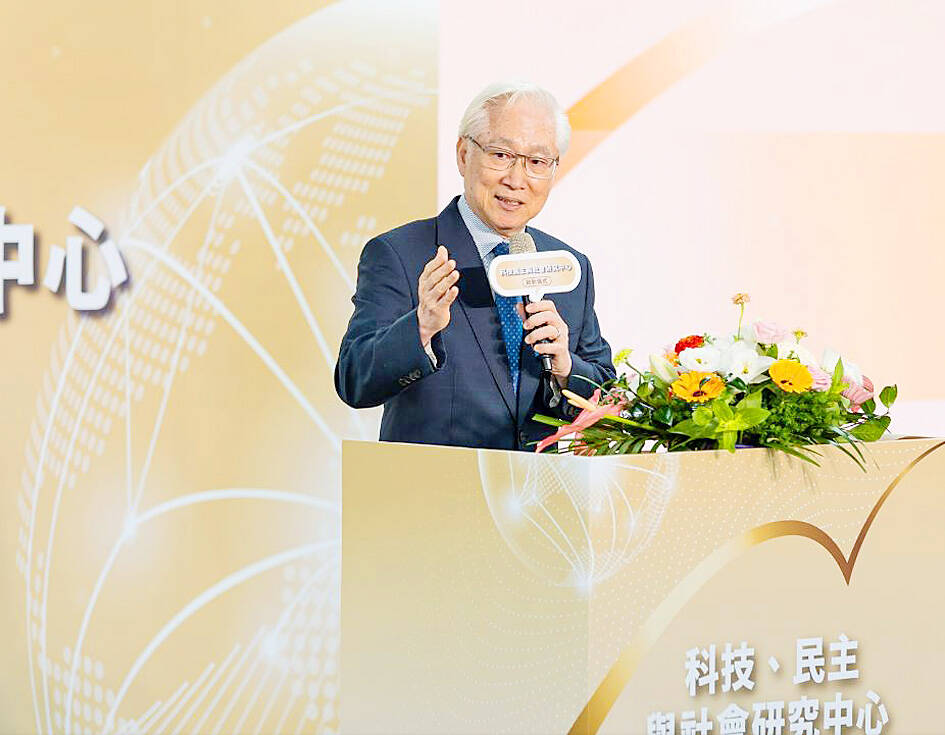The National Science and Technology Council (NSTC) launched its Research Institute for Democracy, Society and Emerging Technology (DSET) yesterday, Taiwan’s first national-level interdisciplinary institute dedicated to assessing and responding to the impacts that emerging technologies bring to democracy.
Speaking at the launch ceremony in Taipei, NSTC Minister Wu Tsung-tsong (吳政忠) emphasized that national science and technology policy extends its influence beyond the government and technology giants to encompass various societal groups and the public as part of Taiwan’s democratic governance and practice.
“The DSET is therefore tasked with conducting systematic research on the effects and risks that the development of emerging technologies might bring to the humanities and society,” he said.

Photo: Screen grab from the council’s Facebook page
The council said that the new institute aims to foster connections between the government, society and the public in areas such as artificial intelligence, semiconductors, quantum computing, space technology, precision medicine, clean energy and information security.
Also present at the ceremony was Chen Dung-sheng (陳東升), the convener of the DSET’s advisory committee, who outlined the institute’s major missions, which include providing interdisciplinary policy recommendations and cultivating talent across generations.
Acknowledging that no single think tank in Taiwan can accomplish all tasks, Chen, a sociology professor at Taiwan Normal University, suggested collaboration with institutions such as the Chung-Hua Institution for Economic Research and the Institute for National Defense and Security Research to build an ecosystem for policy research.
The DSET is also set to explore the interactive impact of emerging technologies on democratic society, political dimensions and economic dimensions from a Taiwanese perspective, the council said in a statement.

Taipei, New Taipei City, Keelung and Taoyuan would issue a decision at 8pm on whether to cancel work and school tomorrow due to forecasted heavy rain, Keelung Mayor Hsieh Kuo-liang (謝國樑) said today. Hsieh told reporters that absent some pressing reason, the four northern cities would announce the decision jointly at 8pm. Keelung is expected to receive between 300mm and 490mm of rain in the period from 2pm today through 2pm tomorrow, Central Weather Administration data showed. Keelung City Government regulations stipulate that school and work can be canceled if rain totals in mountainous or low-elevation areas are forecast to exceed 350mm in

EVA Airways president Sun Chia-ming (孫嘉明) and other senior executives yesterday bowed in apology over the death of a flight attendant, saying the company has begun improving its health-reporting, review and work coordination mechanisms. “We promise to handle this matter with the utmost responsibility to ensure safer and healthier working conditions for all EVA Air employees,” Sun said. The flight attendant, a woman surnamed Sun (孫), died on Friday last week of undisclosed causes shortly after returning from a work assignment in Milan, Italy, the airline said. Chinese-language media reported that the woman fell ill working on a Taipei-to-Milan flight on Sept. 22

COUNTERMEASURE: Taiwan was to implement controls for 47 tech products bound for South Africa after the latter downgraded and renamed Taipei’s ‘de facto’ offices The Ministry of Foreign Affairs is still reviewing a new agreement proposed by the South African government last month to regulate the status of reciprocal representative offices, Minister of Foreign Affairs Lin Chia-lung (林佳龍) said yesterday. Asked about the latest developments in a year-long controversy over Taiwan’s de facto representative office in South Africa, Lin during a legislative session said that the ministry was consulting with legal experts on the proposed new agreement. While the new proposal offers Taiwan greater flexibility, the ministry does not find it acceptable, Lin said without elaborating. The ministry is still open to resuming retaliatory measures against South

1.4nm WAFERS: While TSMC is gearing up to expand its overseas production, it would also continue to invest in Taiwan, company chairman and CEO C.C. Wei said Taiwan Semiconductor Manufacturing Co (TSMC) has applied for permission to construct a new plant in the Central Taiwan Science Park (中部科學園區), which it would use for the production of new high-speed wafers, the National Science and Technology Council said yesterday. The council, which supervises three major science parks in Taiwan, confirmed that the Central Taiwan Science Park Bureau had received an application on Friday from TSMC, the world’s largest contract chipmaker, to commence work on the new A14 fab. A14 technology, a 1.4 nanometer (nm) process, is designed to drive artificial intelligence transformation by enabling faster computing and greater power